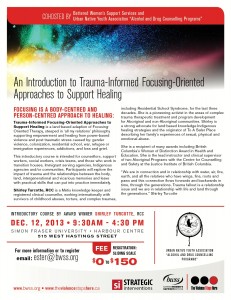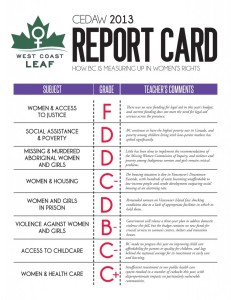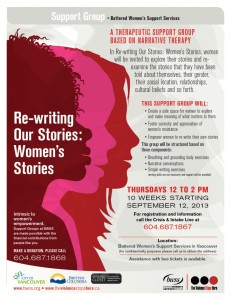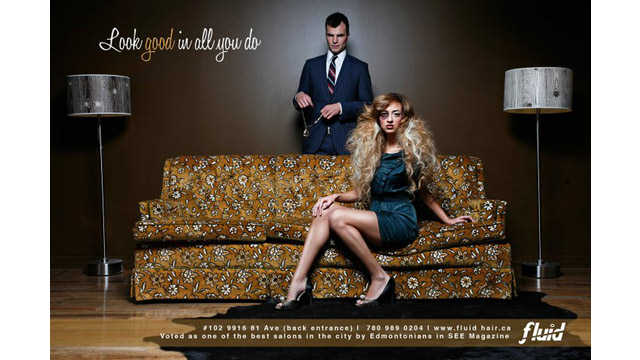An Introduction to Trauma-informed Focusing-Oriented Approaches to Support Healing
Battered Women’s Support Services and Urban Native Youth Association “Alcohol and Drug Counselling Programs” co-host:
An Introduction to Trauma-informed Focusing-Oriented Approaches to Support Healing
Focusing is a body-centred and person-centred approach to healing. Trauma-Informed Focusing-Oriented Approaches to Support Healing is a land-based adaption of Focusing-Oriented Therapy, steeped in ‘all my relations’ philosophy supporting empowerment and healing from power-based violence and post-traumatic stress caused by: gender violence, colonization, residential school, war, refugee or immigration experiences, addictions, and loss and grief. This introductory course is intended for counsellors, support workers, social workers, crisis teams, and those who work in transition houses, Indigenous agencies and/or communities and Immigrant serving agencies. Participants will explore the impact of trauma and the relationships between the body, land, intergenerational and vicarious memories and leave with practical skills that can put into practice immediately.
Shirley Turcotte, RCC is a Métis knowledge keeper and registered clinical counsellor, working internationally with survivors of childhood abuses, torture, and complex traumas, including Residential School Syndrome, for the last three decades. She is a pioneering activist in the areas of complex trauma therapeutic treatment and program development for Aboriginal and non-Aboriginal communities. Shirley is a strong advocate for land-based knowledge Indigenous healing strategies and the originator of To A Safer Placedescribing her family’s experiences of sexual, physical and emotional abuse. She is a recipient of many awards including British Columbia’s Woman of Distinction Award in Health and Education. She is the lead instructor and clinical supervisor of two Aboriginal Programs with the Centre for Counselling and Safety at the Justice Institute of British Columbia.
“We are in connection and in relationship with water, air, fire, earth, and all the relatives who have wings, fins, roots and paws and this connection flows forwards and backwards in time, through the generations. Trauma fallout is a relationship issue and we are in relationship with life and land through the generations.” ~ Shirley Turcotte
When:
Thursday, December 12, 2013 9:30 am – 4:30 pm
Where:
Simon Fraser University Centre for Dialogue
515 West Hastings Street, Vancouver, Coast Salish Territory
Room: 320 Strategy Room
Registration:
Sliding Scale Fee: $0 – $150
For more information or to register email ester@bwss.org









